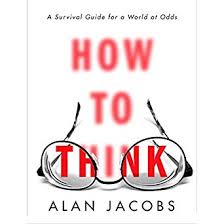However, as Neil Postman shows in his classic volume, Entertaining Ourselves to Death, our culture has cultivated an alternative epistemology by producing and consuming media that shape us in ways that tend to undermine our ability to sustain cogent thought for extended periods of time. My review of that book left more questions than answers about how to overcome this seismic shift in the way we know.
In his book, How to Think: A Survival Guide for a World at Odds, Alan Jacobs actively tackles that challenge, offering an approach to thinking that promises to begin to unravel the tangled know to social dissonance.
Summary
After outlining the problem and its significance in the introduction to his book, Jacobs proceeds to offer some helpful considerations of the nature of thinking and how to do it better. For example, he begins by arguing that thinking must be done in community. Despite the intellectual isolation that often gets attributed to Descartes––I think, therefore I am––Jacobs shows that solitary thinking, divorced from the community, results in antisocial rationalities that often lead to internal conflicts within someone’s vision of the world. Thinking together helps form people for community and sharpen thinking to prevent rational inconsistencies.
Part of thinking together, as Jacobs notes, is ensuring we come to an understanding of the position of others before we respond. Much of our division is the result of people actively misrepresenting their intellectual opponent’s position. This is enabled by our contemporary social climate because there is a prevalence of repulsion to outgroups, whose status of being gross justifies people’s ignorance of their position. For example, many academics (by their own writing) actively despise orthodox Christians and the feeling is reciprocated in many cases, not least because of a regular pattern of condescension and abuse. Those who think will have to overcome our tribalism and seek to understand the position of humans with whom we disagree.
Add to the social dynamic the confusion of communication forums and you have a recipe for incomprehensibility. For example, there are few forms of communication that have a defined audience. The internet makes it possible for someone’s offhand comment or argument shaped for a particular hearer to be dissected, masticated, and hurled back at the writer with incredible bile. For example, a few years ago, TGC contributor, Gaye Clarke write an article about her transformation regarding her views on race and humanity. The article was, fairly plainly, intended to help white evangelicals remove their racial blinders. The language she used, therefore, did not match the latest terminology and Clarke was trolled, abused, and harassed by activists who find her terms repugnant. The article was removed, the woman defamed, and the prejudices of Clarke’s intended audience against “Social Justice Warriors” was confirmed. The conversation has no defined borders. Similarly, the “Sea Lion” phenomena, is when someone overhears (literally or on the internet) a comment not intended for them and persistently harasses the participants in the conversation demanding a response. The technique does much to further division and little to aid communication.
Division is augmented and fertilized by attempts to change and control vocabulary. The standard terminology from five years ago is this year’s hate speech. Or, certain terminology is considered to be permitted only to people within a special demographic. The point is rarely to further human knowledge, but more often to create a power dynamic that disadvantages someone from an out group. For example, the term social justice arose from Roman Catholic literature, but has since been coopted to imply a whole host of anti-human policies. Likewise, the political left is getting increasingly belligerent in their insistence that the only “pro-life” position is full socialism. Jacobs show that words matter, how we use them is important, and that thinking people have to sometimes get beyond delimiting terminology to actually examine differing the support for other positions.
Another critical aspect of Jacobs’ treatise is his undermining the idea that an “open mind” is the ideal state for thinking individuals. While he spends multiple chapters encouraging people to carefully consider other positions and to active reevaluate their own, he is also clear in arguing the point in seeing is not to go on seeing through things, but to actually see some things clearly. Channeling Chesterton, Jacobs argues that the only purpose of an open mind is to close on something solid, like a mouth. So, being a person that thinks does not mean being an ideological drifter.
Finally, How to Think is encouraging, even after all the work Jacobs recommends, because it shows that being a thinking person is well worth the effort. Becoming better thinkers is the only way we are going to get out of the mess we are in.
Conclusion
How to Think is a worthwhile book. It is relatively short, concise, but very important. Although I came into the book agreeing with Jacobs—especially about the importance of thinking—there were multiple times where his examples stepped on my toes and made me reconsider the way I argue and respond to arguments.
For those who want to reach others—to really engage and persuade—this is the sort of volume that can help someone break through barriers and, perhaps, lead even hostile voices on the opposite side of the issue change their minds. Or, at worst, even if it doesn’t help us persuade, it can help us understand and therefore reduce the frustration with our ongoing ideological deadlock.















There’s no reason to doubt that Jesus was nailed to the cross. Ultimately, I trust what Scripture says about Jesus’s crucifixion because I also trust what it says about his resurrection. And that’s what we should be celebrating this week.